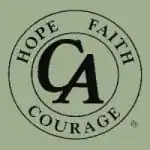Cocaine Anonymous

Cocaine Anonymous (C.A.) is a twelve-step program formed in 1982 for people who seek recovery from drug addiction. It is patterned very closely after Alcoholics Anonymous, although the two groups are unaffiliated. While many C.A. members have been addicted to cocaine, crack, speed or similar substances, C.A. accepts all who desire freedom from "cocaine and all other mind-altering substances" as members.[1]
C.A. uses the book Alcoholics Anonymous[2] as its basic text. Complementing this are the C.A. Storybook, Hope, Faith and Courage: Stories from the Fellowship of Cocaine Anonymous.[3] and the AA book Twelve Steps and Twelve Traditions.[4]
C.A. was formed in Los Angeles in 1982 by the late Johnny Segal and several others. Seagal worked in the film industry and saw a number of people who had difficulty finding help from anyone knowledgeable about the special difficulties presented by cocaine addiction.
Co-Anon (formerly CocAnon) is a program for families of cocaine users, analogous to Al-Anon for the friends and family of alcoholics.[5]
See also
- Addiction recovery groups
- List of twelve-step groups
References
- ↑ Cocaine Anonymous (2007-11-13). "And All Other Mind-Altering Substances". Archived from the original on 2009-03-04. Retrieved 2007-11-15.
- ↑ Alcoholics Anonymous (1976-06-01). Alcoholics Anonymous. Alcoholics Anonymous World Services. ISBN 0-916856-59-3. OCLC 32014950.
- ↑ Cocaine Anonymous (January 1993). Hope, Faith and Courage: Stories from the Fellowship of Cocaine Anonymous. Los Angeles, California: Cocaine Anonymous World Services. ISBN 0-9638193-1-3. OCLC 32014453.
- ↑ Alcoholics Anonymous (2002-02-10). Twelve Steps and Twelve Traditions. Hazelden. ISBN 0-916856-01-1. OCLC 13572433.
- ↑ Cohen, Sidney (1985). The Substance Abuse Problems. New York, New York: Haworth Press. ISBN 0-86656-368-7. OCLC 6666765.
Further reading
- Crits-Christoph, P.; Gibbons, M. B. C.; Barber, J. P.; Gallop, R.; Beck, A. T.; Mercer, D.; et al. (2003-11-01). "Mediators of outcome of psychosocial treatments for cocaine dependence". Journal of Consulting and Clinical Psychology. 71 (5): 918–925. doi:10.1037/0022-006X.71.5.918. PMID 14516240.
- Maude-Griffin, P. M.; Hohenstein, J. M.; Humfleet, G. L.; Reilly, P. M.; Tusel, D. J.; & Hall, S. M. (1997-11-01). "Superior efficacy of cognitive-behavioral therapy for urban crack cocaine abusers: Main and matching effects". Journal of Consulting and Clinical Psychology. 66 (5): 832–837. doi:10.1037/0022-006X.66.5.832. PMID 9803702.
- Weiss, R. D.; Griffin, M. L.; Gallop, R. J.; Najavits, L. M.; Frank, A.; Crits-Christoph, P.; et al. (2005-02-01). "The effect of 12-step self-help group attendance and participation on drug use outcomes among cocaine-dependent patients". Drug and Alcohol Dependence. 77 (2): 177–184. doi:10.1016/j.drugalcdep.2004.08.012. PMID 15664719.
External links
- CA World Services website
- Online meeting website
- Official UK website
- Co-Anon for friends and family of addicts
- Works by or about Cocaine Anonymous in libraries (WorldCat catalog)